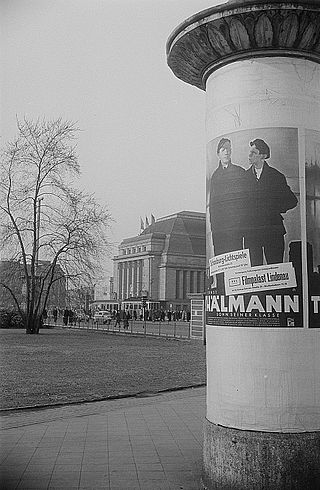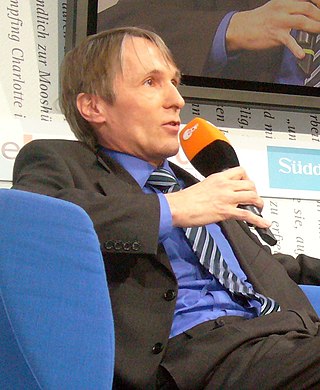
The International Brigades were military units set up by the Communist International to assist the Popular Front government of the Second Spanish Republic during the Spanish Civil War. The organization existed for two years, from 1936 until 1938. It is estimated that during the entire war, between 40,000 and 59,000 members served in the International Brigades, including some 10,000 who died in combat. Beyond the Spanish Civil War, "International Brigades" is also sometimes used interchangeably with the term foreign legion in reference to military units comprising foreigners who volunteer to fight in the military of another state, often in times of war.

Erich Ernst Paul Honecker was a German communist politician who led the German Democratic Republic from 1971 until shortly before the fall of the Berlin Wall in November 1989. He held the posts of General Secretary of the Socialist Unity Party of Germany (SED) and Chairman of the National Defence Council; in 1976, he replaced Willi Stoph as Chairman of the State Council, the official head of state. As the leader of East Germany, Honecker was viewed as a dictator. During his leadership, the country had close ties to the Soviet Union, which maintained a large army in the country.

Erich Fritz Emil Mielke was a German communist official who served as head of the East German Ministry for State Security, better known as the Stasi, from 1957 until shortly after the fall of the Berlin Wall in 1989.

Egon Rudi Ernst Krenz is a German former politician who was the last Communist leader of the German Democratic Republic during the Revolutions of 1989. He succeeded Erich Honecker as the General Secretary of the ruling Socialist Unity Party of Germany (SED) but was forced to resign only weeks later when the Berlin Wall fell.

Günter Schabowski was an East German politician who served as an official of the Socialist Unity Party of Germany, the ruling party during most of the existence of the German Democratic Republic (GDR). Schabowski gained worldwide fame in November 1989 when he improvised a slightly mistaken answer to a press conference question about the future of the Berlin Wall. That raised popular expectations much more rapidly than the government planned and so massive crowds gathered the same night at the Wall, which forced its opening after 28 years. Soon afterward, the entire inner German border was opened.
Articles related to East Germany include:

Wilhelm Zaisser was a German communist politician and statesman who served as the founder and first Minister for State Security of the German Democratic Republic (1950–1953).
The Ernst Thälmann Island is a 15 km (9.3 mi) long and 500 m (1,600 ft) wide island in the Gulf of Cazones that is named after Ernst Thälmann, a German communist politician. During a 1970s state visit to the German Democratic Republic (GDR), Fidel Castro made a promise that Cuba would donate an island to the East German government, and Cayo Blanco del Sur was renamed in a ceremony during a state visit by Erich Honecker. But after the reunification of Germany, when a German newspaper tried to visit the island, they were told this transfer had only been "symbolic".

Ernst Thälmann is an East German film in two parts about the life of Ernst Thälmann, leader of the Communist Party of Germany during much of the Weimar Republic, directed by Kurt Maetzig and starring Günther Simon in the title role. The first part, Ernst Thälmann - Sohn seiner Klasse, was released in 1954. It was followed by the 1955 sequel. Ernst Thälmann - Führer seiner Klasse.

The Roter Frontkämpferbund, usually called the Rotfrontkämpferbund (RFB), was a far-left paramilitary organization affiliated with the Communist Party of Germany (KPD) during the Weimar Republic. It was officially a non-partisan and legally registered association. The organisation was banned by the governing Social Democrats in 1929.
The Thälmann Battalion was a battalion of the International Brigades in the Spanish Civil War. It was named after the imprisoned German communist leader Ernst Thälmann and included approximately 1,500 people, mainly Germans, Austrians, Swiss and Scandinavians. The battalion fought in the defence of Madrid. Amongst the commanders of the battalion were the German writer, historian and World War I officer Ludwig Renn and Prussian World War I officer Hans Kahle, later promoted to lead the Republican 45th division for a time. The battalion also included writer Willi Bredel, who became its commissar.

Heinrich Gottlob "Heiner" Rau was a German communist politician during the time of the Weimar Republic; subsequently, during the Spanish Civil War, he was a leading member of the International Brigades and after World War II a leading East German statesman.

Willi Bredel was a German writer and president of the DDR Academy of Arts, Berlin. Born in Hamburg, he was a pioneer of socialist realist literature.

Hubertus Knabe is a German historian and was the scientific director of the Berlin-Hohenschönhausen Memorial, a museum and memorial in a notorious former Stasi torture prison in Berlin. Knabe is noted for several works on oppression in the former communist states of Eastern Europe, particularly in East Germany. He early became involved with Green politics, and was active in the Green Party in Germany.

Kurt Lichtenstein was a communist journalist, and his death was a notable result of the German Democratic Republic's border control policies.
Reserved for the Death is an East German film. It was released in 1963.

The Kommando Landstreitkräfte was the Army staff — and simultaneously the Army command of the National People's Army (NPA) Land Forces of the former GDR.

Friedrich Dickel was a German politician, who served as the interior minister of East Germany for nearly twenty-six years.

The East German Republic Day Parade of 1989 was a parade on Karl-Marx-Allee in East Berlin on 7 October 1989 commemorating the 40th anniversary of the establishment of East Germany. This was the last East German Republic Day Parade and the last major East German political event with the regime falling mere weeks later. In Germany, this parade is remembered as the end of "the great period of military parades".
Hans Oliva-Hagen was a journalist, writer, and screenwriter in the German Democratic Republic who wrote under the pseudonyms Hans Oliva and John Ryder. His most important works include his collaboration on the scripts for the DEFA film Carbide and Sorrel (1963) and the five-part GDR television film Conscience in Riot (1961). An anti-fascist militant and Holocaust survivor of Jewish heritage, Oliva-Hagen was active in the German resistance to Nazism.















